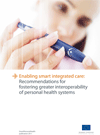
The overriding goal of the European Commission (EC) co-funded project SmartPersonalHealth is to promote a greater understanding of the value of interoperability among Personal Health Systems and between them and other eHealth systems, in the landscape of continuity of integrated care, and across multi-cultural environments in Europe. This publication explores key concepts in PHS interoperability, summarises related EU policy developments, synthesises discussions with stakeholders, and sets out recommendations to the European Commission, national governments, stakeholder groups, and industry for fostering greater interoperability of PHS. The focus of these recommendations is on raising awareness with different stakeholders about the needs for and benefits from interoperability, the value of building up a body of knowledge and collecting evidence as well as the need for collaboration and exchange of good practice.
These recommendations for fostering greater interoperability of personal health systems are derived from three stakeholder consultation workshops and the final conference of SmartPersonalHealth as well as from various informal discussions with stakeholder groups. The final conference was held as a satellite event to the Continua Health Alliance European Symposium 2011 on 17th January 2011 in Brussels.
Download Enabling Smart Integrated Care: Recommendations for Fostering Greater Interoperability of Personal Health Systems (.pdf, 1.115 KB).
Download from eHealthNews.eu Portal's mirror: Enabling Smart Integrated Care: Recommendations for Fostering Greater Interoperability of Personal Health Systems (.pdf, 1.115 KB).
For further information, please visit:
http://sph.continuaalliance.org
About the partners in the SmartPersonalHealth Project
The SmartPersonalHealth project is a Support Action project partially funded by the Directorate-General Information Society of the European Commission under the 7th Framework Programme.
Continua Health Alliance is the global industry consortium to promote the interoperability of PHS devices and systems counting more than 200 technology, medical device and health care members worldwide.
ETSI, the European Telecommunications Standards Institute, produces globally applicable standards for Information & Communications Technologies. ETSI is recognised as an official European Standards Organisation by the European Union, enabling valuable access to European markets.
IHE, Integrating the Healthcare Enterprise, is a global initiative involving more than 300 stakeholders (healthcare professional associations, industry, health authorities, etc.), the worldwide reference organisation for the interoperability of healthcare information systems and devices.
Empirica is a Bonn based European research institute with a broad understanding of political, business and socio-economic issues surrounding eServices and telematics applications.
Edelman | The Centre, coordinating the project, is a European consultancy, with expertise in public affairs, communication and events organisation.